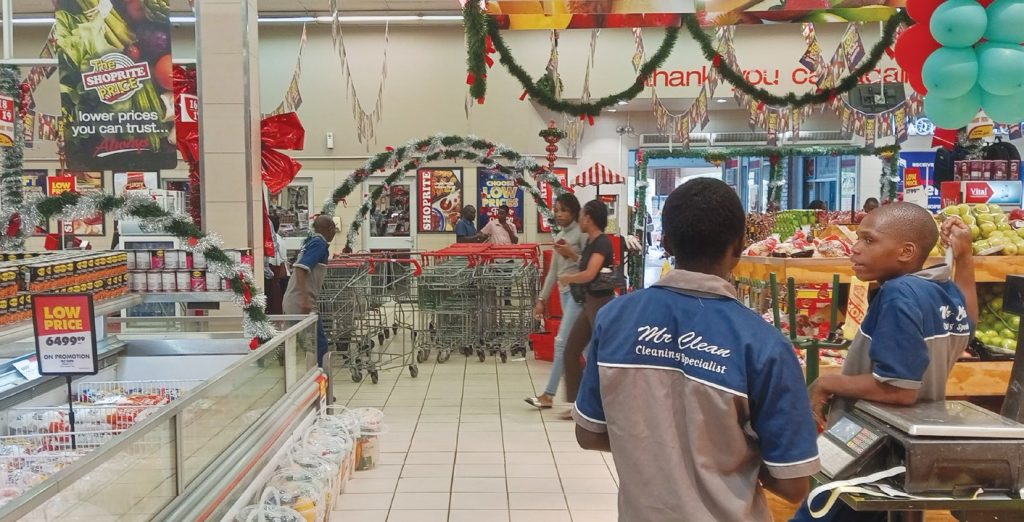Tight Christmas as devaluation subdues spending
“There will be no Christmas cheer for me and my family,” that is how Irish potatoes vendor Menard Kachepa, of Mbayani Township in Blantyre, reacted yesterday when asked about his festive season plans.
“Christmas is now a luxury rather than a necessity for me. I am more worried about my day-to-day life now, how I will pay my bills and help my parents in the village,” he said.

Kachepa’s plight mirrors what many Malawians are going through as they brace for subdued Christmas and New Year festivities due to the 44 percent kwacha devaluation in November that has reduced their purchasing power.
Six days to Christmas Day, spot-checks in Blantyre, Mzuzu and Lilongwe cities yesterday established a pattern of dwindling number of shoppers in the country’s major supermarkets and markets.
In shops such as Shoprite, Game Stores and Sana in Blantyre, there were no long queues at noon yesterday while piles of shopping trolleys could be seen lying idle at the entrance as most shoppers were simply buying a handful items.
The trend was similar in Lilongwe and Mzuzu as consumers decried that the cost-of-living crisis has dampened enthusiasm for Christmas.
This was a sharp contrast to previous years when shops and markets at this time are filled with consumers stocking up for the festivities and beyond.
Malawi University of Science and Technology senior lecturer Dr Paul Makocho, who was spotted at Shoprite in Blantyre, said the devaluation has eroded people’s purchasing power.
In an interview, he said he has been forced to cut his budget on Christmas to buy only essential items.
“For instance, the price of one kilogramme of beef is now selling at K9 000 from K6 000. Prices have really gone up and it’s tough,” said Makocho.
Charity Makhalira, a resident of Manase Township in Blantyre, said she will only afford a portion of what she normally buys for Christmas because her earnings remain the same despite devaluation.
“Even if you want to buy more things, where do you get the extra money?” the 31-yera-old wondered.
At Blantyre Market, rice seller Richard Seveni, 35, said he is yet to witness a surge in customers, attributing it to economic hardships where people were living hand-to-mouth.
In Mzuzu, Sarah Banda of Chibavi Township said the price of food after devaluation has seen her weekly groceries shopping costs almost doubled.
“We do worry about the cost of things leading up to Christmas, but we will just be a little bit more cautious this year on what we spend on,” she said.
Renowned economist Milward Tobias, has since warned Malawians against spending irresponsibly during the festive season.
He said people should celebrate responsibly bearing in mind the harsh economic times the country is going through.
Said Tobias: “Ensure the spending on celebration does not affect budgets for school fees and farming activities because these are crucial and many people land into unplanned borrowing to finance these budgets.
“Let us also remember to share whatever we have with the less privileged so that they can see our love.”
In a separate interview, Consumers Association of Malawi executive director John Kapito said it is a tough period for every consumer, as people no longer have disposable income.
“People are really struggling this year, meaning Christmas will make things even tougher,” he said. “People are at breaking point, and it hurts.”
He called on consumers to prioritise essential things and do away with luxuries that do not add value to their lives.
“This is the period that we should budget carefully, knowing that there is the month of January which requires rentals, utility bills and school fees.
“In other words, let us just postpone this year’s festive celebrations and pretend as if Christmas and New Year do not exist, otherwise we have nothing to show for it,” said Kapito.
Meanwhile, Centre for Democracy and Economic Development Initiative executive director Sylvester Namiwa has called on the government to intervene in commodity prices and job losses which some Malawians suffered.
Inflation, the rate of the general rise in prices over a given period of time, has been on the rise for the past 12 months to August, largely due to increase in food and non-food items.
However, in September and October, Malawi’s year-on-year inflation declined to 27.8 percent and 26.9 percent, respectively. n
ADDITIONAL reporting by STEVEN PEMBAMOYO and RALPH MVONA, Staff Reporters






One Comment